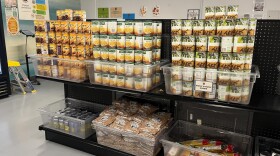Updated April 3, 2024 at 2:16 PM ET
Take a stroll through the produce section at your local grocery store, and you'll likely have to decide whether to buy organic or conventional fruits and vegetables.
There's a bounty of factual information about the differences between organic and non-organic produce, in addition to many common public perceptions — and misperceptions — about which fruits and vegetables are safe and healthy. It can be confusing.
Last week, the nonprofit Environmental Working Group released its annual "dirty dozen" list of the produce items containing the most pesticides, according to data from the Department of Agriculture and Food and Drug Administration. Strawberries and spinach topped the list.
EWG senior toxicologist Alexis Temkin says the guide is meant to be a resource for consumers interested in lowering their exposure to pesticides, which she says have been linked to health concerns.
"It's one way to provide information about some of the potential reasons why we think people might want to be concerned about pesticides in their fruit and vegetables," Temkin told NPR.
"It was never meant to dissuade consumption or advise avoiding any of these 'dirty dozen' items. It's really about how to choose fruits and vegetables effectively to reduce pesticide exposure while still eating a lot of fruits and vegetables."
While the EWG says they don't want to dissuade people from eating produce, Marvin Pritts, a professor of horticulture at Cornell University, feels that it can have that effect. Pritts says the scientific consensus is that pesticide residue at government-regulated levels is safe for consumption, and that eating conventional fruits and veggies is far healthier than skipping produce at your next meal.
"It can deter you from eating things that are good for you," Pritts said. "Most scientists and people who study this don't think [pesticide residue] levels come anywhere close to causing harmful toxicological effects on people."
Organic vs. conventional produce, explained
The EWG highlighted the presence of pesticides, including fungicides, in 75% of the conventional produce that was tested. Ninety-five percent of 'dirty dozen' fruits and vegetables tested contained pesticide residue.
The group said some research has indicated that fungicides — which are among the most commonly used pesticides — could disrupt human hormonal systems, but that more research was necessary.
Still, Pritts believes the focus on pesticides is misguided, noting that the Environmental Protection Agency sets "tolerances" for the amount of pesticides that can safely remain on produce sold in the U.S.
The EWG's position is that just because a pesticide or tolerance is legal, that doesn't necessarily mean it's safe. Temkin points to the EPA's ongoing effort to limit the use of the insecticide chlorpyrifos, which has been in use but has been linked in some studies to harmful effects on children's brains if pregnant women are exposed.
The EWG argues that the EPA in its pesticide registration process should give more weight to independent safety studies and how individual pesticides interact with others, and also noted that researchers in 2019 found that the U.S. permitted dozens of pesticides that were banned or being phased out in the European Union, China and Brazil.
Pritts said experts recommend that growers cycle through various pesticides to prevent insects or diseases from developing a resistance to a single one, which could explain why some fruits and vegetables were recorded having more pesticides than others. The EWG analysis considers a number of measures, including the percent of samples with detectable pesticides, the number of pesticides found and the average amount of pesticides.
Buying organic also doesn't necessarily mean avoiding pesticides, since organic growers can use pesticides derived from natural substances.
Consumers may even bear some of the blame for the use of pesticides, Pritts said. One example, he noted, is that growers have had to use pesticides on their apples to keep them free of spots and blemishes, because otherwise shoppers wouldn't buy them.
So what can I do?
Pritts said none of that is meant to dissuade people from buying organic produce, as long as they can afford it and recognize that scientists haven't found any major nutritional benefits.
The EWG also encourages people to get more produce on their plate regardless of how it's grown, but says organic diets can reduce synthetic pesticide exposure. The group also disseminates a list of fruit and vegetables with the lowest number of pesticides, including avocados, sweet corn and pineapple.
"One serving of blueberries that's not organic is not necessarily what we're talking about with some of these health concerns," Temkin said. "It's about chronic low-dose exposures over a lifetime and then also during particularly sensitive windows" such as childhood.
If you buy conventionally grown fruits and vegetables, washing them can help remove dirt and bugs, but it won't remove pesticide residue, Pritts said. "The residues are inside the cells and they're there to stay."
Pritts noted that people who get ill from food are often sickened by bacteria — not pesticides. He recommends washing your produce before you eat it rather than when you put it in the fridge, since moisture on fruit and vegetables can help bacteria and fungus grow.
In his own life, Pritts is part of an organic CSA (community-supported agriculture) program where he lives. He likes that the farmer uses natural harvesting methods, but says that's not why he signed up.
"I belong to that not because he's organic, but because he's local," he said. "I think that the best thing you can do for the environment is to grow your food close to where you live."
Copyright 2024 NPR. To see more, visit https://www.npr.org. 9(MDAzMjM2NDYzMDEyMzc1Njk5NjAxNzY3OQ001))






